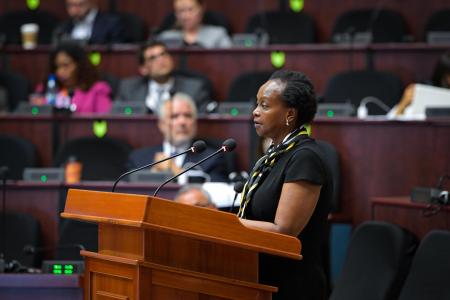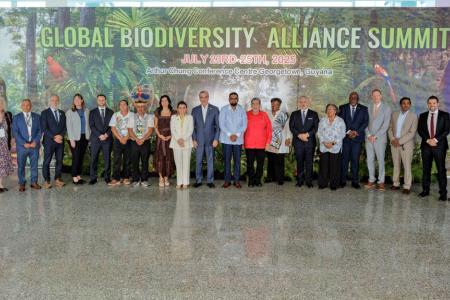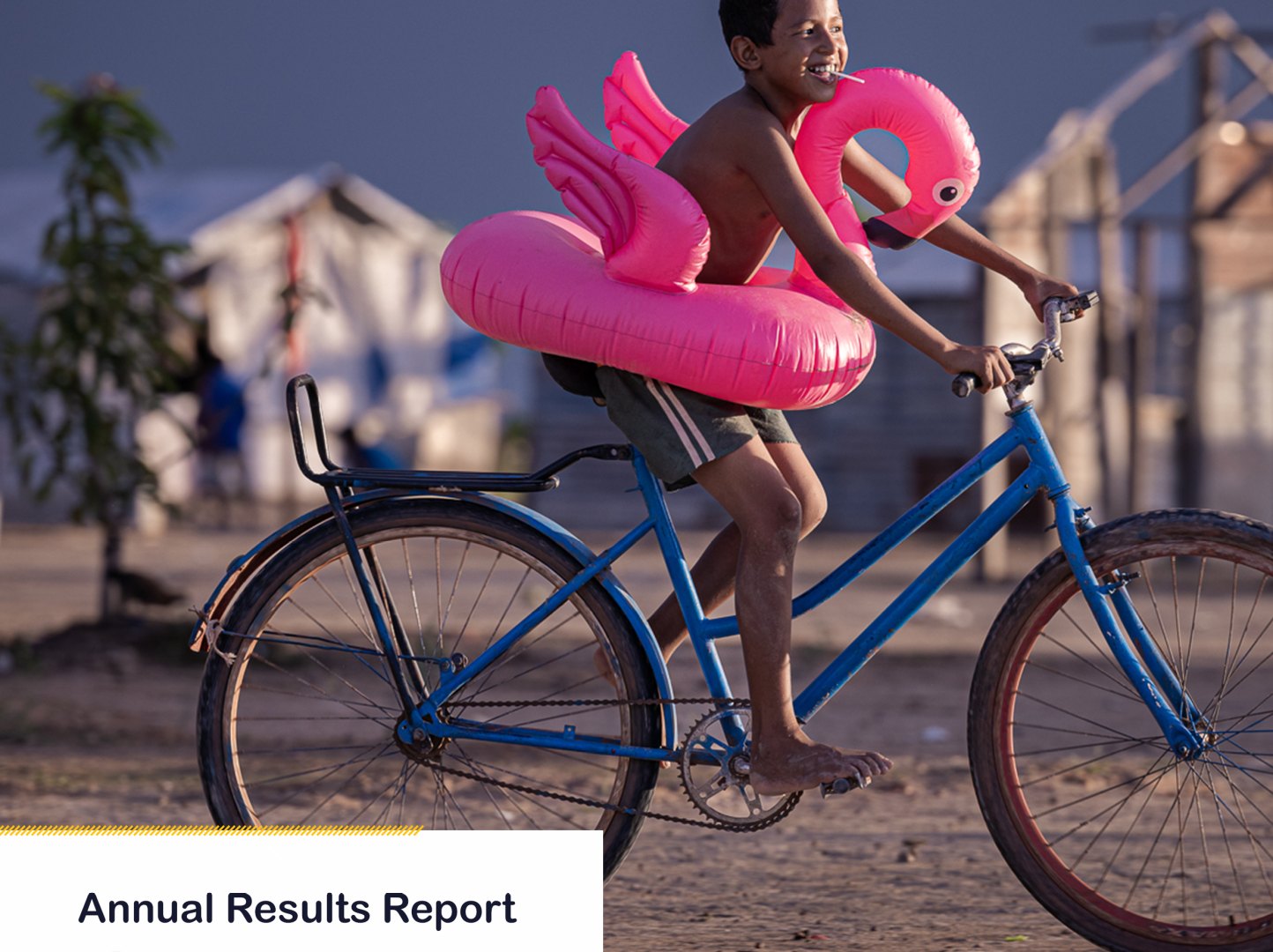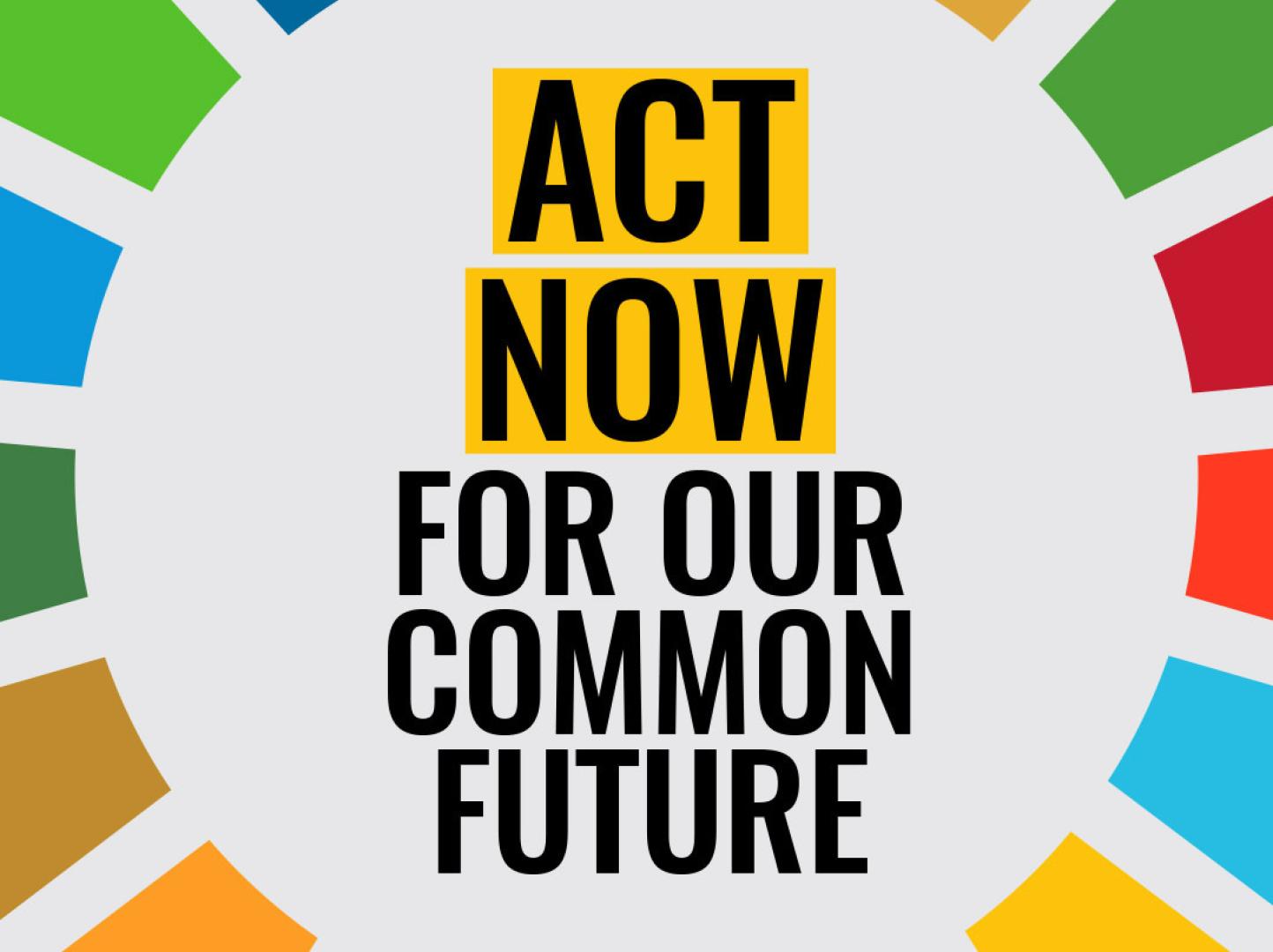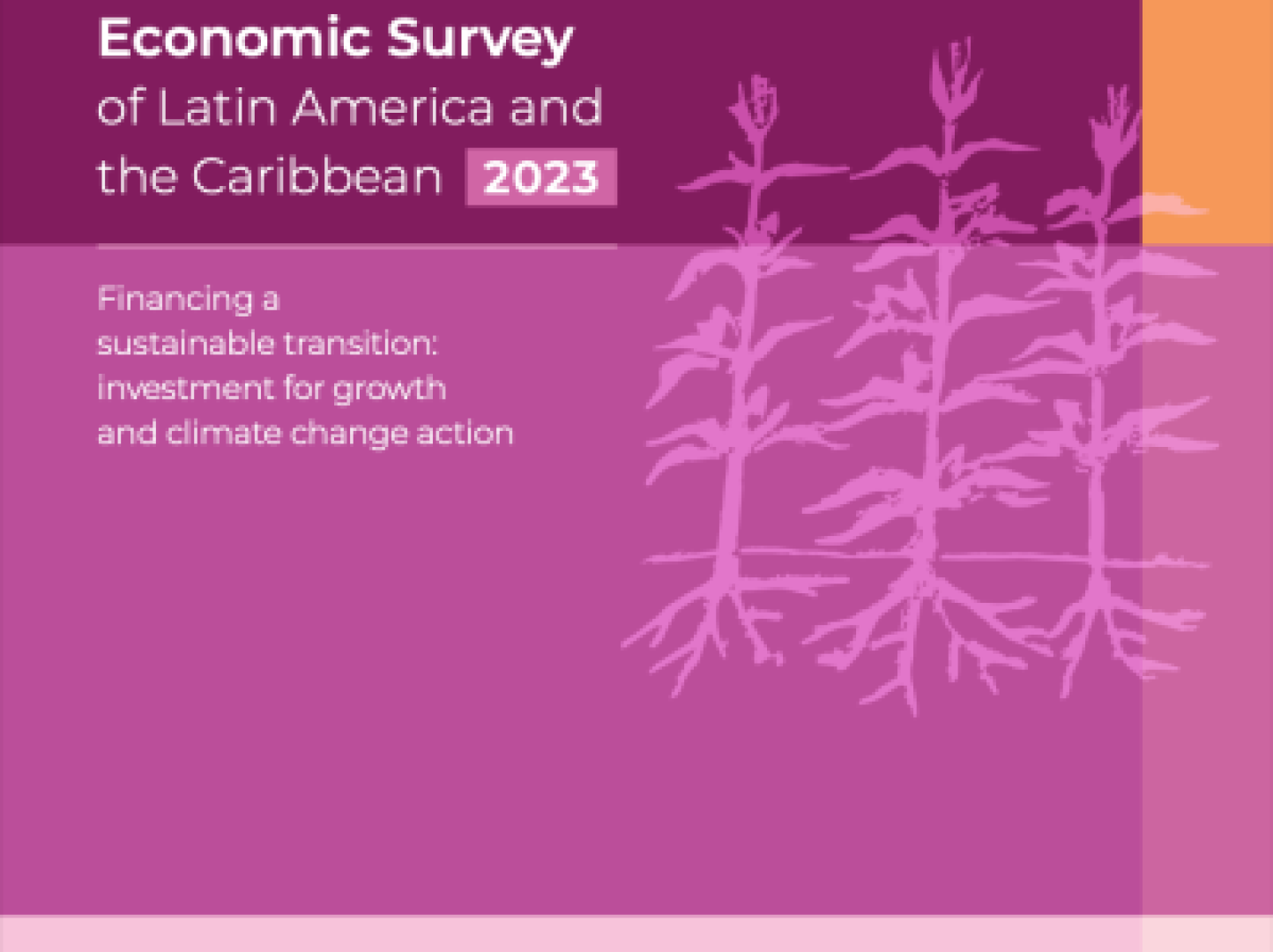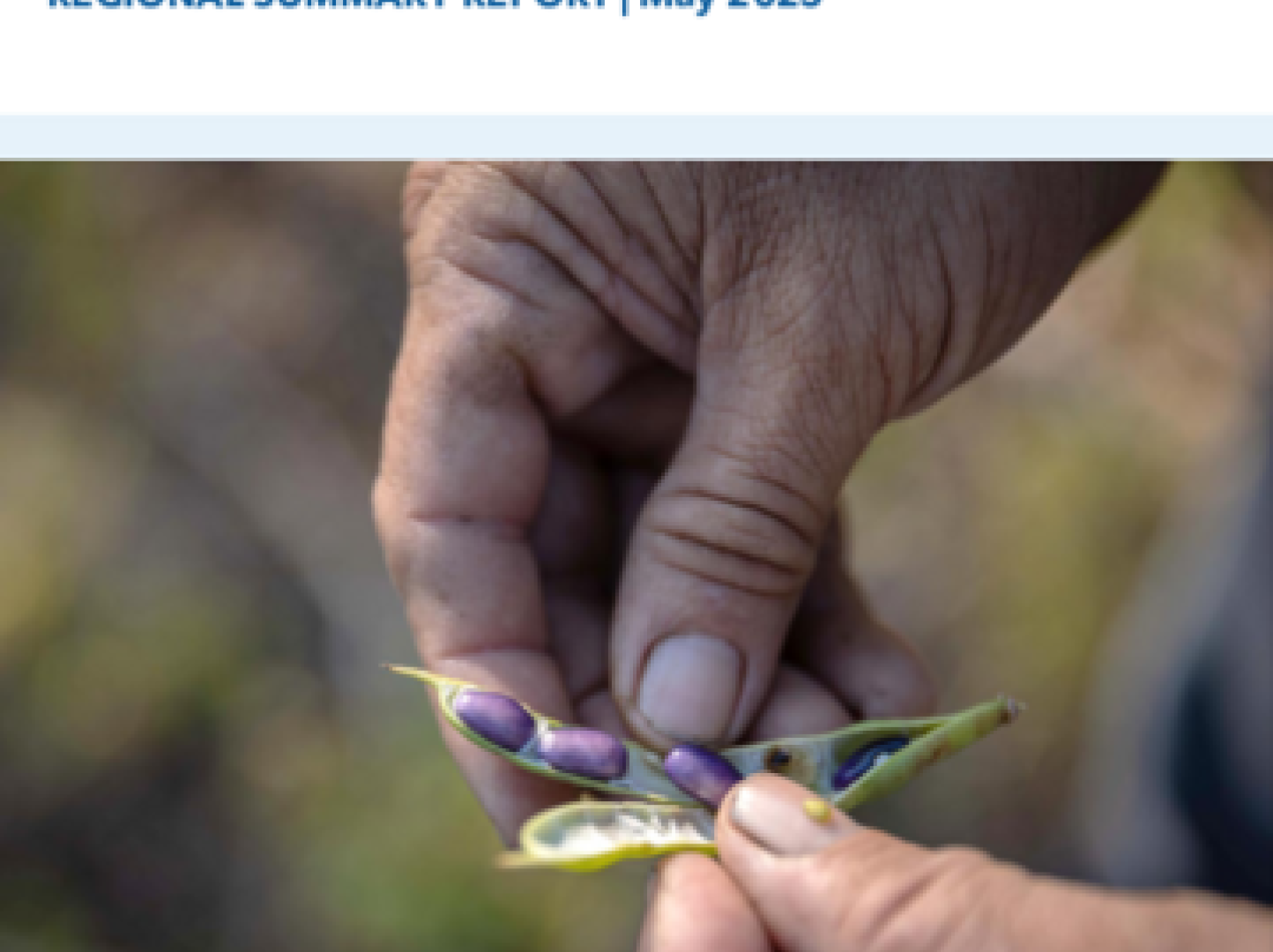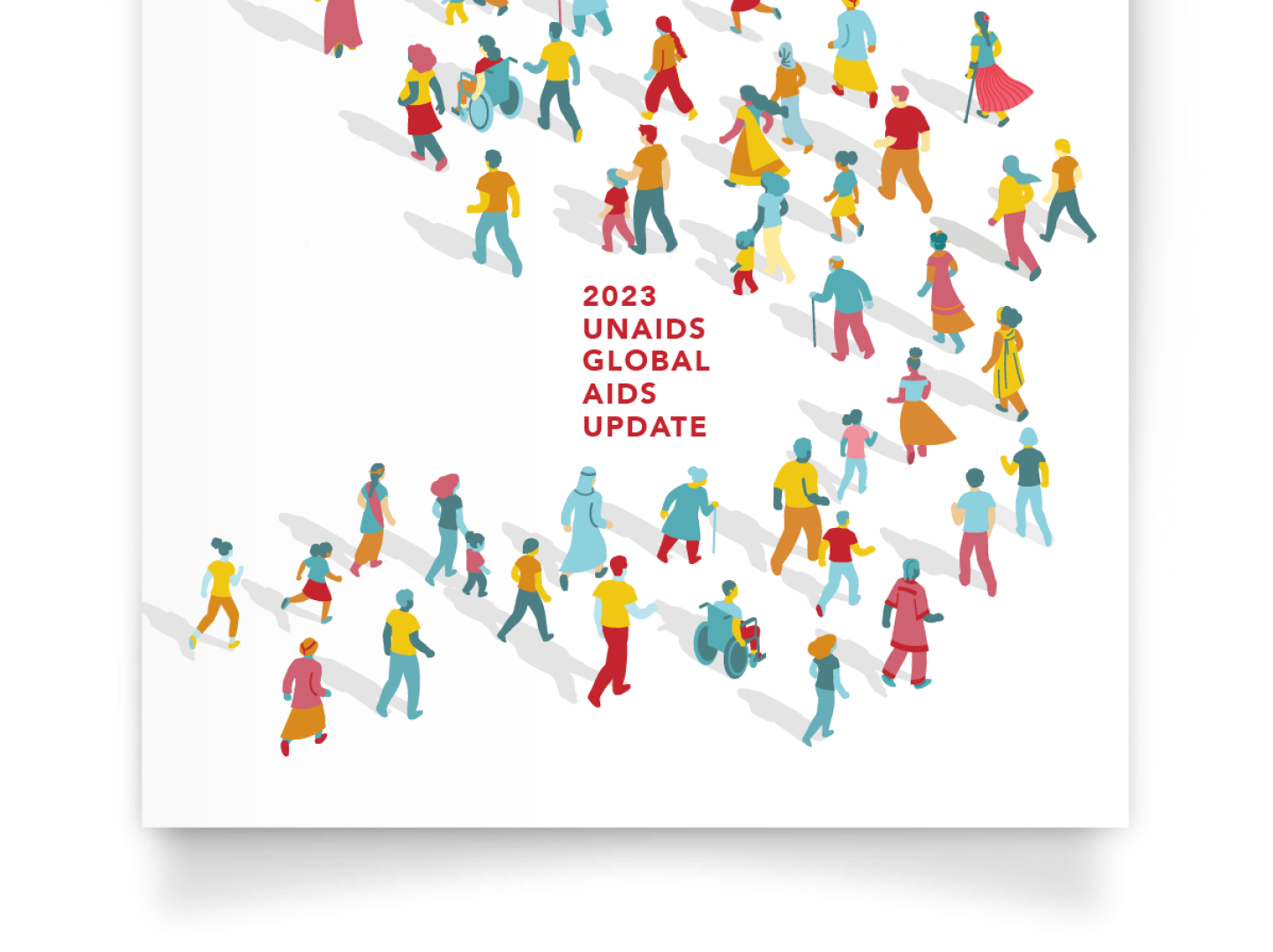Latest
Story
15 December 2025
UN Volunteers Strengthens Its Presence in the Caribbean with Renewed Outreach in Guyana
Learn more
Story
15 December 2025
Human Rights and Anti-Corruption Expo 2025 Celebrates “Everyday Essentials”
Learn more
Speech
05 November 2025
Speech by UN Resident Coordinator Jean Kamau at the opening of the Beijing +30 national dialogue
Learn more
Latest
The Sustainable Development Goals in Guyana
The Sustainable Development Goals are a global call to action to end poverty, protect the earth's environment, and ensure that people everywhere can enjoy peace and prosperity.
Kindly note that the data visualizations show an aggregate of the Caribbean. To view the disaggregated data for Guyana, please select it from the dropdown menu.
Video
06 February 2024
Programme - Guyana's role on the UN Security Council
In January 2024 Guyana assumed its seat as an elected member of the United Nations Security Council for a two-year term 2024-2025.
Mr. Robert Persaud, Guyana's Foreign Secretary and High Representative for Guyana's UN Security Council Affairs and Yeşim Oruç, UN Resident Coordinator discussed the importance of Guyana's role on the Security Council.
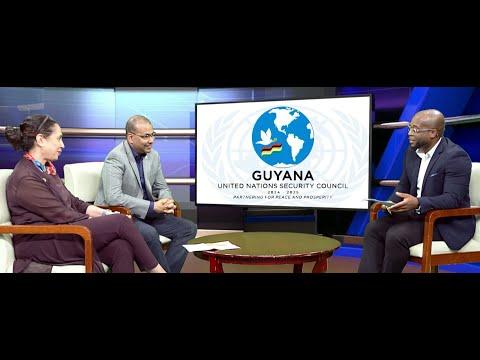
Story
15 December 2025
Human Rights and Anti-Corruption Expo 2025 Celebrates “Everyday Essentials”
On December 9–10, 2025, the United Nations Guyana Country Team participated in the 4th Annual Human Rights and Anti-Corruption Expo at the Arthur Chung Conference Centre, an event that united government agencies, civil society and the public in a shared showcase of work advancing human rights and integrity. Organized by the Ministry of Parliamentary Affairs and Governance (MPAG), the two-day event drew students, teachers, community groups and members of the public, offering interactive displays, educational dialogue and outreach on human rights protections and anti-corruption efforts across the nation.The expo’s theme, “Our Everyday Essentials: Rights and Integrity,” reflected this year’s global Human Rights Day campaign led by the United Nations Office of the High Commissioner for Human Rights (OHCHR). The UN campaign particularly emphasizes that human rights are foundational elements we rely on throughout daily life, from safety and dignity to freedom of expression and equality before the law.Each year, the expo grows in scope and recognition, now described as the only event of its kind in the region. The MPAG thanked agencies for their creativity, professionalism and dedication, noting that their contributions helped make the 2025 expo a success and ensured that the event remained meaningful, credible and nationally relevant. Visitors particularly praised the exhibits' engaging, interactive nature and the agency's welcoming staff. Many participants also shared their experiences on social media, extending the expos’ reach beyond the two days of programming and drawing broader public attention to the importance of human rights and anti-corruption work. The expo took place in the context of Human Rights Day 2025, observed each year on December 10 to commemorate the adoption of the Universal Declaration of Human Rights in 1948.According to the OHCHR, human rights are positive, essential and attainable. They are everyday essentials that enable people to participate in society, express themselves freely, live without fear, access services and opportunities, and demand accountability when rights are violated.In Guyana, the 2025 expo reinforced these principles by making human rights tangible for diverse audiences, especially young people and educators. The event also highlighted national efforts to respect, protect and fulfill human rights while promoting integrity and combating corruption, two goals that are connected in any democratic society striving for justice and accountability.As officials and participants look ahead, there is optimism that future expos and related activities will continue to grow and strengthen, fostering broader public awareness and deepening appreciation for the essential role human rights play in everyday life.
1 of 5
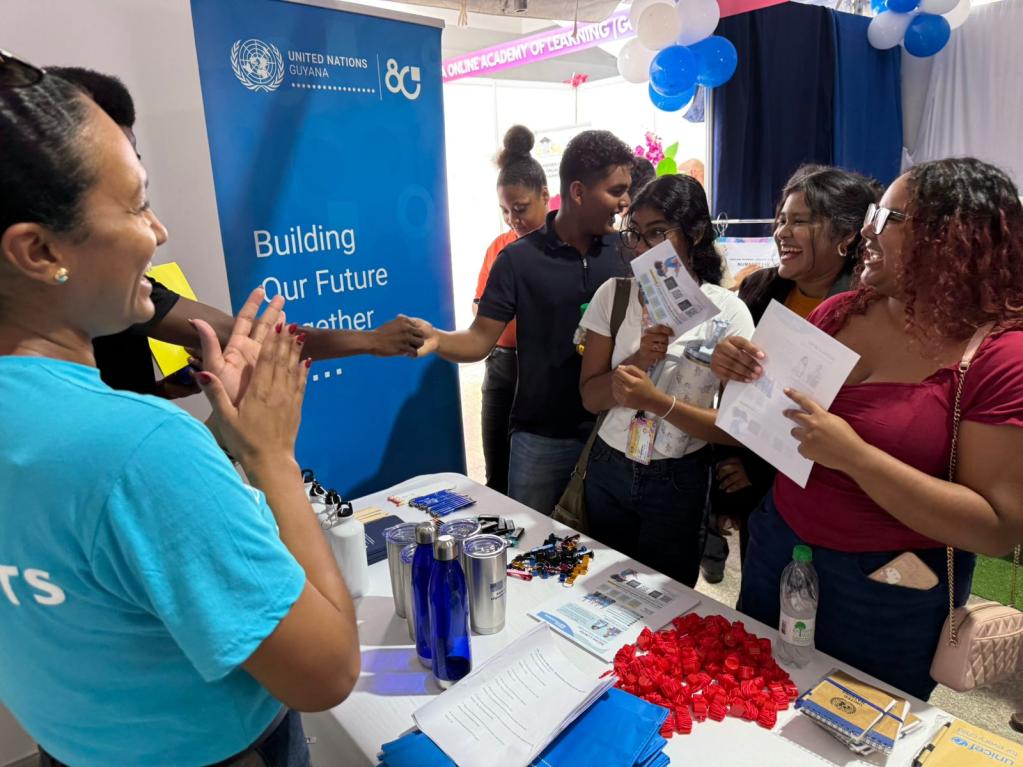
Story
15 December 2025
UN Volunteers Strengthens Its Presence in the Caribbean with Renewed Outreach in Guyana
UN Volunteers (UNV) is taking concrete steps to reposition and strengthen its presence in the Caribbean region with the appointment of a new Focal Point for the Southern Caribbean, currently based in Georgetown, Guyana. This initiative reflects UNV’s renewed commitment to engaging governments, partners, and communities while promoting volunteerism as a key driver of sustainable development.As part of its public information and outreach efforts, UNV recently participated in the Human Rights and Anti-Corruption Exhibit held on 9–10 December, organized by the Ministry of Parliamentary Affairs and Governance. UNV joined other UN entities at the UN booth, where representatives engaged with Guyanese government officials and members of the general public. Particular interest was shown by students, many of whom expressed enthusiasm about joining UN Volunteers and learning how they could contribute to the Sustainable Development Goals (SDGs) and participate in activities leading up to the International Year of Volunteers in 2026.To further raise awareness about UNV’s role and legacy in Guyana, a video was produced highlighting the period when the country hosted one of the largest UNV programmes in the Latin America and Caribbean region. The video recounts the impact of volunteerism during those years and underscores UNV’s continued relevance in supporting national development priorities today.The renewed engagement is being led by Mr. Cesar Guedes (Peru/Canada), who has been appointed as the new Focal Point for the Southern Caribbean. Mr. Guedes brings over 30 years of United Nations experience, having begun his UN career in 1992 as a UN Volunteer in Guyana. Most recently, he served as the UNODC Country Representative in Afghanistan and has also completed several years of service at UNV Headquarters in Bonn, Germany.UNV’s strengthened presence in Guyana marks an important step in revitalizing partnerships across the Southern Caribbean, enhancing public awareness of volunteerism, and positioning UN Volunteers as a strategic partner in advancing the SDGs and the International Year of Volunteers 2026.
1 of 5

Story
30 July 2025
The UN Celebrates Guyana’s Commitment to Children with Disabilities
The Government of Guyana formally adopted the Core Principles for Engaging Persons with Disabilities, a landmark step toward inclusive development, equity, and human dignity.This milestone was celebrated at the Unleash Ability Summit, hosted by UNICEF Guyana, which brought together a diverse group of stakeholders. The gathering focused on empowering persons with disabilities, including children, to participate in society as leaders and equals.The eight Core Principles for Engaging People, Including Children, with Disabilities emphasize respect, inclusion, and accountability. These principles include treating persons with disabilities respectfully and using inclusive language; ensuring every child with disabilities has full and effective access to education and healthcare; recognizing the right to self-determination; ensuring equal rights in family life; encouraging employment and participation in cultural and recreational life; safeguarding well-being; delivering services with privacy and dignity; and upholding high standards of professional conduct.The principles were jointly endorsed by a broad coalition of stakeholders including the Private Sector Commission (PSC), the Georgetown Chamber of Commerce and Industry (GCCI), members of the Diplomatic Corps, key government ministries, the National Commission on Disability, the Guyana Council of Organisations for Persons with Disabilities (GCOPD), and United Nations agencies. Speaking at the summit, Dr. Gillian Smith, UN Resident Coordinator (a.i), described the summit as more than a conference but a call to action. “Inclusion is not optional; it is foundational. Disability is not a deficit; it is a form of human diversity. Today, we stand together to break down social, cultural, and institutional barriers and create systems that are inclusive by design,” she said.Delivering the feature address, Hon. Dr. Vindhya Persaud, Minister of Human Services and Social Security, reaffirmed the Government’s commitment to building a more inclusive society. “A nation is judged by how it treats its most vulnerable and we are committed to ensuring equal rights and inclusive opportunities,” she said. Echoing her sentiments, Hon. Dr. Frank Anthony, Minister of Health, noted that his ministry has been working assiduously with persons across different regions to be inclusive. He emphasized the expansion of inclusive healthcare as a national priority.Noting that UNICEF’s work is strictly guided by the Convention on the Rights of Persons with Disabilities (CRPD), Mr. Abdul Saleh, UNICEF Representative for Guyana and Suriname (a.i), said, “At UNICEF, we work every day to protect and promote the rights of every child, without exception. Children with disabilities deserve not just access to services, but the opportunity to lead, thrive, and shape the future.” The Unleash Ability Summit, first of its kind, served as a platform for persons with disabilities to share their experiences and help shape solutions. Through focused group discussions, participants addressed key issues such as accessibility in public spaces and transportation, as well as challenges in healthcare, education, housing, and employment. These conversations are expected to result in concrete actions and priorities for 2025–2027 to help build a more inclusive future for all in Guyana.While the Persons with Disabilities Act (2010) remains a foundational legal framework, there was a collective call for renewal of the Act at the Summit. Participants underscored that true inclusion requires more than legislation. It demands implementation, sustained investment, and most importantly, the leadership and participation of persons with disabilities themselves. First published by UNICEF Guyana [edits made by the Office of the UN Resident Coordinator]
1 of 5

Story
29 July 2025
Feeding Progress: Putting People at the Heart of Food Systems Transformation
Since the world came together at the 2021 UN Food Systems Summit, countries have been working to turn promises into progress. Now at the 2025 Food Systems Summit +4 Stocktake, the global community is taking stock, and one issue is clear: stronger food systems lead to better futures, driving progress across the Sustainable Development Goals (SDGs). Across diverse country contexts, UN Country Teams (UNCTs) under the leadership of Resident Coordinators (RCs) are supporting national efforts to make these transformations real, aligning their expertise and partnerships to help deliver results from the ground up. Ethiopia: Seeds of resilience and growth In Ethiopia, food systems change is tied to something bigger: lifting people out of poverty, withstanding climate shocks and creating more inclusive economic opportunities. Since 2023, UN-backed nursery sites in Semera, Hawassa, Jimma, and Bahir Dar have been supplying seedlings that are already greening 173 hectares of land in and around cities. For 80,000 smallholder farmers, new farming tools and training have turned 25,000 hectares into productive fields. Beyond these numbers is a shift in the country’s capacity: the UN supported the mobilisation of $129 million from the World Bank to strengthen the Oromia Forest and Wildlife Enterprise, reinforcing Ethiopia’s capacity to manage its natural resources in a sustainable way.Joint programmes, that bring together the UN team under the leadership of the RC, are sparking change in value chains too. The SMART Food Systems initiative led by Food and Agriculture Organization (FAO) and World Food Programme (WFP), is opening markets and finance for farmers in Ethiopia’s Somali, Sidama and Southern Regions, while another joint efforts by FAO, UN Industrial Development Organization (UNIDO), UN Capital Development Fund (UNCDF), International Fund for Agricultural Development (IFAD) in Ethiopia’s largest region, Oromia, is unlocking over USD 25 million in public and private investments to modernise Ethiopia’s poultry market.Guyana: Farmers feeding classrooms and futuresIn Guyana’s remote Region 9, food systems investments are creating a ripple effect that begins with innovation in farming and culminates in full classrooms and healthier children. Farmers are learning new ways to grow, and children are eating better because of it.Through climate-smart agriculture initiatives led by FAO, 77 local farmers have been trained to adopt modern farming techniques like greenhouse systems that increase harvests while protecting against climate shocks. These efforts feed into Guyana’s leadership role across the Caribbean, where the country is driving regional food security through the “25 x 25 + 5” initiative to cut food imports by a quarter by 2025.The results are felt beyond the field. The joint WFP/FAO Home-Grown School Feeding (HGSF) programme, reaches 14 to 16 primary schools and feeds 2,500–2,600 schoolchildren using ingredients sourced from nearby farms. For 75 smallholder farmers, including 28 women, this is more than a market: it’s a pathway to entrepreneurship, backed by dedicated training and reliable buyers.The impact is visible: Children are coming to school more regularly, classrooms are livelier, and the food on their plates is more nutritious. To keep that momentum going, the UN is helping roll out the School Menu Planner PLUS tool, which designs healthy menus while prioritising local produce.By connecting smarter farming with better school meals, the UN and its partners are helping to revitalise rural economies, strengthen education, and bring better food and better opportunities to some of Guyana’s most underserved communities. Indonesia: Women powering change with digital tools Indonesia has woven food systems transformation into its long-term plans, linking it to climate goals and food security. The President of Indonesia has made a bold commitment to food systems transformation, recognising their interconnectedness with the country’s climate ambitions. On the ground, the story is about people, especially women, using innovation to reshape their futures. With UN support, women entrepreneurs across several provinces are using technology to boost productivity and access markets. In East Nusa Tenggara, digital platforms have enhanced traceability and efficiency in the seaweed value chain while empowering women throughout the production cycle - from seedling to harvest. In Yogyakarta, women-led Ulva seaweed businesses saw a twelvefold increase in sales after receiving targeted support in quality control, packaging, and digital marketing. The MyNyale initiative, named for a symbol of selflessness and unity, brings together farmers, artisans, and entrepreneurs under one shared brand. Through a centralised quality control hub and a digital platform for marketing and innovation, it has helped more than 1,000 small businesses join forces. Over 1,300 entrepreneurs, many of them women, have learned to use digital tools, showing how technology can turn good ideas and hard work into thriving, resilient businesses.Jordan: Building food security through dataIn Jordan, the journey toward sustainable food security is being reshaped through strong national leadership and UN support. In 2024, with UN support under the leadership of the Resident Coordinator, the government launched its first National Food Security Management Information System, a digital backbone that tracks everything from food stocks to supply risks. A new dashboard within the National Center for Security and Crisis Management now gives decision-makers real-time data to guide action and investments. Jordan further advanced its leadership in the region with the launch of a Mashreq-wide Food Security and Nutrition Observatory, also supported by the UN.A strong partnership between the Government of Jordan and the UN Joint SDG Fund is being further expanded through a Joint Programme that brings together, under the RC’s leadership, 14 UN agencies, working together to scale innovation, from climate-smart farms to agro-processing and storage facilities, generating income, reducing food loss, and creating jobs. These efforts form part of a coordinated, multi-sectoral transformation enhancing food security, resilience, and inclusive development across the Kingdom. Kyrgyzstan: Policies taking root on the groundIn Kyrgyzstan, change is starting with policy but reaching all the way to kitchens and classrooms. With coordinated support from the UN, the Government has advanced a series of foundational policies, including a Food Security and Nutrition Program (2025-2030), new draft Food Safety Law, a Strategic Plan for Veterinary Services (2024–2028) and other sector specific programmes. The RCO brought together FAO, WFP and UN Conference on Trade and Development (UNCTAD) for an inclusive policy dialogue that helped the country better understand the true costs of its food systems. This work is helping the government align its budgets with the real needs of farmers and families. These efforts are reinforced by the Scaling Up Nutrition coalition, which includes FAO, UN Children’s Fund (UNICEF), WFP and World Health Organization (WHO). Together, they are ensuring that national policies are not only well-designed but grounded in the realities of local communities.Those policies are showing up in daily life. More than 2,000 people have been trained in food safety and processing, and over 900 community infrastructure projects, from irrigation channels to drinking water systems, have improved water access for 60,000 hectares of farmland, benefiting 52,000 households. Togo: Scaling up food systems for 2030Togo has developed an ambitious 2030 roadmap for food systems transformation with the FAO, IFAD, and WFP. The plan focuses on five priorities: sustainable farming and fisheries, better use of agricultural products, access to healthy food, gender equality, and stronger governance and financing.Progress is already visible. In 2024, Togo recorded a record cereal production of 1.5 million tons, against a backdrop of steady growth since 2019, while poultry numbers topped 38 million, and fish farming rose from just 20 tons in 2011 to 1,300 tons. With UN support, over 15,000 producers and 10,000 vulnerable farming households, more than half led by women, grew their yields through training, digital advisory tools in local languages, and stronger value chains.The Resident Coordinator’s Office helped mobilise €11 million from the European Union and $9.3 million from the African Development Bank for climate resilience and food system strengthening, showing how global support is fuelling national transformation. Central Sahel: Co-creating resilient food systemsIn Burkina Faso, Mali, and Niger, food systems are becoming the foundation for something bigger: peace. Governments and the UN are working side by side on Flagship Programmes that blend farming, livestock, fisheries, and climate-smart practices, targeting regions most affected by insecurity and environmental stress.In Burkina Faso and Mali, priority value chains, rice, sorghum, millet, livestock (meat and dairy), and aquaculture, are being modernised through expanded irrigation, certified climate-resilient seeds, advanced rice milling and meat processing facilities, and innovative integrated rice-fish farming systems. In Niger, 43,155 hectares of degraded land were restored last year, while over 1,000 hectares of new irrigated plots are growing cereals and vegetables. With governments, international lenders, private investors, and philanthropists joining forces, the region is proving that food systems can be more than a source of meals. they can be a pathway to resilience.
This story was first published on the UN Sustainable Development Group website.
This story was first published on the UN Sustainable Development Group website.
1 of 5
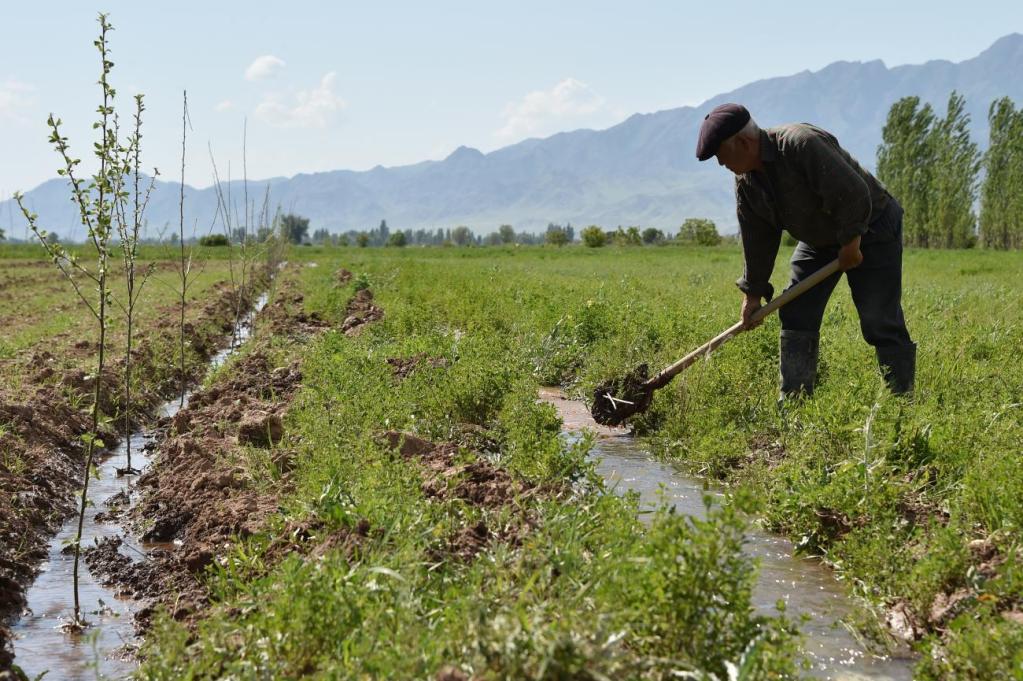
Story
25 July 2025
UN Resident Coordinator Calls for Global Action to Protect Biodiversity at Summit in Guyana
Jean Kamau, United Nations Resident Coordinator in Guyana, delivered a powerful message at the Global Biodiversity Alliance Summit: the world is at a critical moment for protecting nature—and it’s time to turn promises into real action.Guyana’s Example: Protecting Nature and Supporting PeopleKamau praised Guyana for showing how nature and development can go hand in hand. From its Low Carbon Development Strategy to its leadership in biodiversity and carbon credits, Guyana is proving that protecting the environment can also support economic growth and community wellbeing.“In Guyana, biodiversity is not a concept—it is a way of life,” Kamau said. “It flows through the rivers, stands tall in the rainforests, sparkles along reef systems, and breathes in communities who have cared for this land for generations.” She highlighted the special role of Indigenous peoples, calling them the “original stewards of biodiversity.” Their traditional knowledge, deep respect for the land, and sustainable practices are essential to helping the world live in balance with nature.Progress, But Big Challenges RemainAround the world, more countries are making progress in protecting the environment—but big challenges remain.Biodiversity continues to be destroyed at record levels, driven by climate change, unsustainable land use, pollution and degradation. Even though Indigenous communities are key to protecting ecosystems, they are still often left out of important decisions. Many countries also struggle with a lack of money, data, and resources to meet global goals like protecting 30% of land and oceans by 2030.The Opportunity: Act Now, TogetherDespite the challenges, Kamau said the world has everything it needs to make real progress—the knowledge, the frameworks and the will.“The opportunity before us is to align ambition with action,” she said.She called on countries and communities to:Put biodiversity at the heart of climate, agriculture, food systems, and financeSupport Indigenous leadership and local community effortsUse ecological wealth from biodiversity credits to uplift economiesWork together to turn global plans into real results in people’s livesFrom Promises to ProgressKamau said the UN system is ready to help countries move from plans to action—by supporting local data systems, community-led monitoring, inclusive decision-making, and helping to unlock financing for countries championing the biodiversity agenda.“Let us build a global alliance not only in name—but in sustained partnership, shared resources, and bold implementation.”
1 of 5
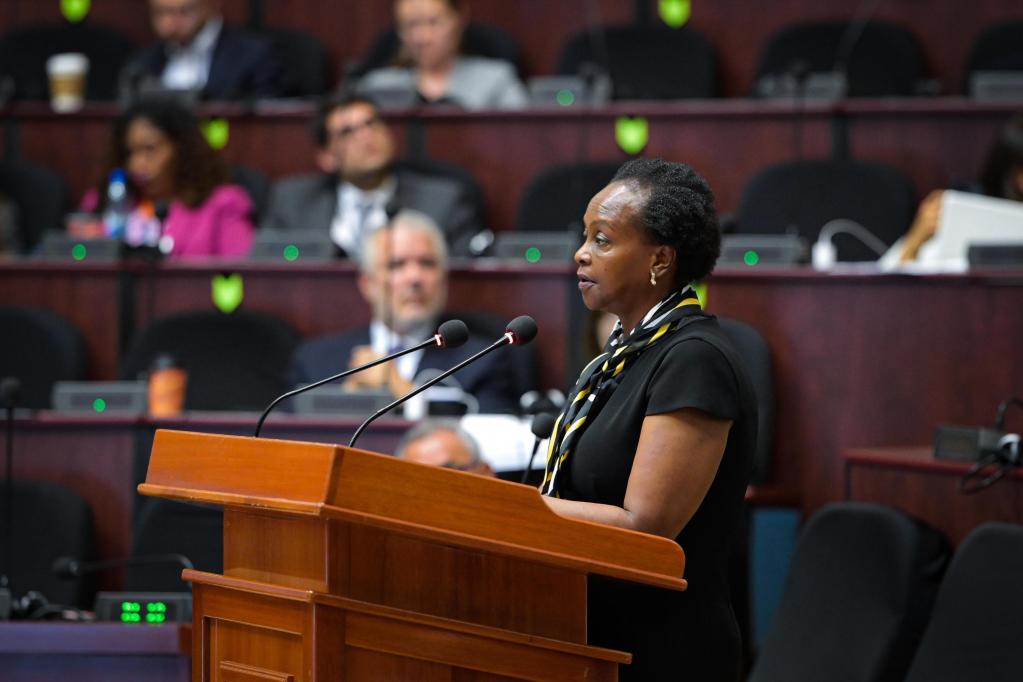
Press Release
06 May 2025
Guyana’s human rights record to be examined by Universal Periodic Review
Guyana is one of 14 States to be reviewed by the UPR Working Group during its upcoming session from 28 April to 9 May 2025. The first, second and third UPR reviews of Guyana took place in May 2010, January 2015 and January 2020, respectively.The UPR Working Group is comprised of the 47 Member States of the Human Rights Council. However, each of the 193 UN Member States can participate in a country review.The documents on which the reviews are based are: 1) national report - information provided by the State under review; 2) information contained in the reports of independent human rights experts and groups, known as the special procedures, human rights treaty bodies, and other UN entities; 3) information provided by other stakeholders including national human rights institutions, regional organizations, and civil society groups.The three reports serving as the basis for the review of Guyana on 6 May can be found here.Location: Room XX, Palais des Nations, Geneva.Time and date: 14:30 – 18:00, Tuesday, 6 May 2025 (GMT+1).The UPR is a peer review of the human rights records of all 193 UN Member States. Since its first meeting was held in April 2008, all 193 UN Member States have been reviewed thrice. During the fourth UPR cycle, States are again expected to spell out steps they have taken to implement recommendations posed during their previous reviews which they committed to follow up on and highlight recent human rights developments in the country.The delegation of Guyana will be led by Ambassador Ms. Carolyn Rodrigues-Birkett, Permanent Representative of Guyana to the United Nations in New York, accompanied by Ms. Oneidge Walrond, Minister of Tourism, Industry and Commerce.The three country representatives serving as rapporteurs (“troika”) for the review of Guyana are Belgium, Democratic Republic of the Congo, and Dominican Republic.The webcast of the session will be at: https://webtv.un.org/en/asset/k1q/k1qw0iej2oThe list of speakers and all available statements to be delivered during the review of Guyana will be posted on the UPR Extranet.The UPR Working Group is scheduled to adopt the recommendations made to Guyana on Friday, 9 May 2025, between 16:00 and 18:00 (GMT+1). The State under review may wish to express its positions on recommendations posed to it during its review.// ENDS // For more information and media requests, please contact Pascal Sim, Media Officer, at simp@un.org, David Díaz Martín, Public Information Officer at david.diazmartin@un.org, and Matthew Brown, Public Information Officer, at matthew.brown@un.orgTo learn more about the Universal Periodic Review: www.ohchr.org/en/hr-bodies/upr/upr-mainSign up for the UN Human Rights Council Newsletter: https://mailchi.mp/a3a538479938/hrc-mailshot-to-ohchr-global
1 of 5
Press Release
09 October 2024
United Nations Development Programme in Guyana partners with the Ethnic Relations Commission to address hate speech in Guyana, support institutional strengthening and build public resilience against it
This partnership comes when Guyana prepares for the 2025 General Elections, a period that historically witnesses a surge in ethnic and racial hate speech.In an age of unprecedented information access, a click, a swipe, or a scroll can open a constant stream of news, articles and social media posts competing for our attention. However, within this ocean of data lies a hidden danger: hate speech from information pollution. Understood as the spread of false, misleading, manipulated and otherwise harmful messages, information pollution can quietly shape opinions, instigate conflict, and erode trust in reliable information. As experienced during the pandemic and now with the multiple crises worldwide, information pollution is threatening our ability to make informed decisions, participate in democratic processes, and contribute to the building of inclusive, peaceful and just societies. In fact, the United Nations Secretary-General has identified this phenomenon as a major contemporary threat, emphasizing the urgent need for comprehensive strategies to combat it.In this scenario, UNDP, as the largest United Nations provider of electoral assistance and with extensive experience in the field of democratic strengthening, is developing a series of innovative tools to support national, regional, and global efforts to promote information integrity and the resilience of information systems. Similarly, the ERC, being a constitutional entity mandated to promote the elimination of all forms of discrimination, has long recognized the impact of hate speech on societal divisions and is committed to proactive measures to counteract it. As part of the MoU, UNDP will provide comprehensive support to the ERC, including:1. Technical assistance to strengthen ERC’s existing methodologies for mapping and countering disinformation and hate speech.
2. Strengthen ERC’s capacities to access social media data, providing crucial insights into information pollution.
3. Enhancing the ERC’s technological infrastructure to better respond to these challenges.Central to this initiative is the ‘Digital Kit for Democracy,’ which includes the powerful eMonitor+ system—a state-of-the-art social media monitoring and analysis tool that leverages artificial intelligence to track and analyse harmful content across various platforms. eMonitor+ facilitates the extraction and analysis of thousands of pieces of information from platforms like Facebook, Instagram, Twitter, YouTube, and others. This information increases knowledge of pernicious phenomena in the information ecosystems of countries and regions.Furthermore, as it is deployed simultaneously in various countries with different information dynamics, eMonitor+ is helping establish a standardized language and comparative data collection, analysis, and dissemination methodologies, so that cross-border dialogue, learning and cooperation can be facilitated. This makes eMonitor+ particularly useful in contexts with little research or data available on these topics. Only in 2024, six countries in Latin America and the Caribbean have started implementing eMonitor+ (Bolivia, Chile, Ecuador, Panama, Peru, Venezuela), and have since accessed a portfolio of good practices, innovative approaches, and partnership possibilities to tackle electoral mis/disinformation and hate speech. The UNDP Resident Representative for Guyana and Surinam, Mr. Gerardo Noto said, "by equipping the ERC with the tools and methodologies to combat hate speech and misinformation, we are taking proactive measures to strengthen democracy and promote social cohesion."The Chairman of the ERC, Shaikh Moeenul Hack, noted that “the ERC launched a proactive Countering Hate Speech campaign aimed at reducing racial and ethnic violations in the lead-up to the elections. The E-Monitoring Tool will be instrumental in enhancing our capacity to capture a wider reach of content. This innovative, automated system will efficiently identify key words and phrases that are racially and ethnically offensive, allowing us to respond more swiftly and effectively.”Through this collaboration, the ERC will enhance its Media Monitoring Unit's capacity to identify and address racially- and ethnically-motivated hate speech, disinformation, and technology-facilitated gender-based violence. The implementation of eMonitor+ will provide ERC with the necessary tools to extract and analyse large volumes of data, fostering a deeper understanding of the challenges posed by information pollution.The signing of the MOU forms part of the wider ERC-UN System campaign to ‘Counter Hate Speech’, which was launched in June 2024. This campaign is an element of UN Guyana’s national implementation of the global United Nations Strategy and Plan of Action on Hate Speech, which highlights the UN’s ongoing commitment to promote peaceful, inclusive and just societies.As this initiative unfolds, both UNDP and ERC look forward to setting a benchmark for collaboration against information pollution in the region, ultimately working toward a more equitable and democratic future for all Guyanese citizens.
2. Strengthen ERC’s capacities to access social media data, providing crucial insights into information pollution.
3. Enhancing the ERC’s technological infrastructure to better respond to these challenges.Central to this initiative is the ‘Digital Kit for Democracy,’ which includes the powerful eMonitor+ system—a state-of-the-art social media monitoring and analysis tool that leverages artificial intelligence to track and analyse harmful content across various platforms. eMonitor+ facilitates the extraction and analysis of thousands of pieces of information from platforms like Facebook, Instagram, Twitter, YouTube, and others. This information increases knowledge of pernicious phenomena in the information ecosystems of countries and regions.Furthermore, as it is deployed simultaneously in various countries with different information dynamics, eMonitor+ is helping establish a standardized language and comparative data collection, analysis, and dissemination methodologies, so that cross-border dialogue, learning and cooperation can be facilitated. This makes eMonitor+ particularly useful in contexts with little research or data available on these topics. Only in 2024, six countries in Latin America and the Caribbean have started implementing eMonitor+ (Bolivia, Chile, Ecuador, Panama, Peru, Venezuela), and have since accessed a portfolio of good practices, innovative approaches, and partnership possibilities to tackle electoral mis/disinformation and hate speech. The UNDP Resident Representative for Guyana and Surinam, Mr. Gerardo Noto said, "by equipping the ERC with the tools and methodologies to combat hate speech and misinformation, we are taking proactive measures to strengthen democracy and promote social cohesion."The Chairman of the ERC, Shaikh Moeenul Hack, noted that “the ERC launched a proactive Countering Hate Speech campaign aimed at reducing racial and ethnic violations in the lead-up to the elections. The E-Monitoring Tool will be instrumental in enhancing our capacity to capture a wider reach of content. This innovative, automated system will efficiently identify key words and phrases that are racially and ethnically offensive, allowing us to respond more swiftly and effectively.”Through this collaboration, the ERC will enhance its Media Monitoring Unit's capacity to identify and address racially- and ethnically-motivated hate speech, disinformation, and technology-facilitated gender-based violence. The implementation of eMonitor+ will provide ERC with the necessary tools to extract and analyse large volumes of data, fostering a deeper understanding of the challenges posed by information pollution.The signing of the MOU forms part of the wider ERC-UN System campaign to ‘Counter Hate Speech’, which was launched in June 2024. This campaign is an element of UN Guyana’s national implementation of the global United Nations Strategy and Plan of Action on Hate Speech, which highlights the UN’s ongoing commitment to promote peaceful, inclusive and just societies.As this initiative unfolds, both UNDP and ERC look forward to setting a benchmark for collaboration against information pollution in the region, ultimately working toward a more equitable and democratic future for all Guyanese citizens.
1 of 5
Press Release
07 August 2024
Ms. Yeşim Oruç, United Nations Resident Coordinator departs Guyana
During her tenure, Ms. Oruç has sought to lead the United Nations system to support the government and people of Guyana to ensure that no-one, regardless of their circumstances, status or identity, is left behind from the 2030 Agenda for Sustainable Development. Ms. Oruç has coordinated the UN System’s support to national authorities in key areas, including gender equality and women’s empowerment, social protection, food systems transformation, labor, employment, and migration. These initiatives were facilitated by strengthened partnerships with development partners, the private sector, non-governmental organisations, academia, civil society, youth, the media, among others.Ms. Oruç has worked to align the UN’s programmatic portfolio in Guyana in support of national development priorities for achieving the SDGs. In so doing, she put inclusivity at the center of the UN’s work. This has resulted in a renewed focus on the situation of women and girls, young people, persons living with disabilities, Guyana’s indigenous peoples, persons living with HIV/AIDS, migrant populations, and other vulnerable groups living in Guyana.“It has been the privilege of my life to serve in a country where a dynamic commitment to global goals is embodied in the national Low Carbon Development Strategy, backed by successive SDG-enabling national budgets. I am immensely grateful for this opportunity to have accompanied this remarkable country on its amazing journey towards achieving the Sustainable Development Goals. I am also fortunate to have worked with some incredible people who are committed to helping Guyana to honour its human rights commitments. In recent months, it has been inspiring to witness Guyana take up its place on the UN Security Council, where today it is striving to ensure that topics like food security and climate security are placed right at the very top of the global agenda,” said Oruc.Ms. Oruç’s successor will be announced in another release.
1 of 5
Press Release
22 July 2024
New UNAIDS report shows Caribbean AIDS epidemic can be ended by 2030, but only if leaders boost resources to prevent new infections and put people on treatment and human rights are protected
Kingston, 22 July 2024—A new report released today by UNAIDS shows the world is at a critical moment that will determine whether world leaders meet their commitment to end AIDS as a public health threat by 2030. The report, ‘The Urgency of Now: AIDS at a Crossroads’, brings together new data and case studies which demonstrate that the decisions and policy choices taken by world leaders this year will decide the fate of millions of lives and whether the world’s deadliest pandemic is overcome. While the end of AIDS is within our grasp, the data show the world is off track. Of the 39.9 million people living with HIV globally, 9.3 million, nearly a quarter, are not receiving life-saving treatment. Consequently, a person dies from AIDS-related causes every minute. In the Caribbean, there has been substantial progress against HIV since 2010, but the reduction in the annual number of new HIV infections slowed down over the past five years. At the end of 2023, Cuba, the Dominican Republic, Haiti and Jamaica, the larger countries in the region, accounted for almost 90% of new infections—with Haiti alone accounting for more than one third (38%) of new HIV infections. People from key populations and their sex partners continued to account for 47% of new infections in 2022.The report finds that if leaders take the bold actions needed now to ensure sufficient and sustainable resourcing and protect everyone’s human rights, the number of people living with HIV worldwide, requiring life-long treatment, will settle at around 29 million by 2050 but if they take the wrong path, the number of people who will need life-long support will rise to 46 million (compared to 39.9 million in 2023). “World leaders pledged to end the AIDS pandemic as a public health threat by 2030, and they can uphold their promise, but only if they ensure that the HIV response has the resources it needs and that the human rights of everyone are protected,” said UNAIDS Executive Director, Winnie Byanyima. “Leaders can save millions of lives, prevent millions of new HIV infections, and ensure that everyone living with HIV can live healthy, full lives.” The report shows treatment coverage continued to expand in the Caribbean, but significant challenges remain as it relates to late diagnosis and enrolling and keeping people living with HIV in care. At the end of 2023, an estimated 85% of people living with HIV knew their status, 70% of all people living with HIV were on treatment, and 61% of all people living with HIV were virally suppressed. The percentage of people living with HIV who were on treatment and virally suppressed rose from 79% in 2018 to 87% in 2023. Treatment coverage was 78% among women (aged 15+ years) and 65% among men (aged 15+ years). Paediatric treatment coverage, at 39%, was, however, much lower than adult treatment coverage in 2023 and late diagnosis of advanced HIV disease (AIDS) remains a significant challenge in the region.The expansion of people accessing treatment is a landmark public health achievement that has seen AIDS-related deaths in the Caribbean fall by 57% since 2010—but a worrying increase has been reported in Belize, Cuba, Guyana, and Suriname.“Prioritising targeted interventions, community-led responses, and integration to leave no one behind; bolstering treatment accessibility and retention in care; advocating for legal reforms; and challenging harmful gender and other social norms will go a long way to address the root causes of risk and vulnerability of people living with, and most affected by, HIV,” said UNAIDS Multi-Country Director for the Caribbean, Dr Richard Amenyah. “There is a great need to strengthen partnerships with communities and enhance the role of civil society to reach vulnerable and at-risk groups that are hard to reach with HIV services or find it difficult, for whatever reason, to engage our health facilities.”The Urgency of Now: AIDS at a Crossroads, shows that decisions taken this year will determine if global targets are met, AIDS is ended as a public health threat by 2030, and a sustainable HIV response is built. The report demonstrates that HIV prevention and treatment services will only reach people if human rights are upheld, if unfair laws against women and against marginalized communities are scrapped, and if discrimination and violence are tackled head on.“Like the title of the report tells us, we are at a crossroads. We can take the road that continues to punish people for who they are, who they love, how they work, and that is the road through which we can never end aids as a public health thread”, says Luisa Cabal, UNAIDS Regional Director for Latin America and the Caribbean. “Or we can choose the road of rights protections, of respecting others, of following the science and the evidence. This is the road that has led to reductions in new infections and to healthy lives.”ContactUNAIDS Caribbean | Jaevion Nelson | tel. +1 876 459 3211 | nelsonj@unaids.orgUNAIDS Latin America & the Caribbean | Daniel de Castro | tel. +507 6998 3175 | decastrod@unaids.org UNAIDSThe Joint United Nations Programme on HIV/AIDS (UNAIDS) leads and inspires the world to achieve its shared vision of zero new HIV infections, zero discrimination and zero AIDS-related deaths. UNAIDS unites the efforts of 11 UN organizations—UNHCR, UNICEF, WFP, UNDP, UNFPA, UNODC, UN Women, ILO, UNESCO, WHO and the World Bank—and works closely with global and national partners towards ending the AIDS epidemic by 2030 as part of the Sustainable Development Goals. Learn more at unaids.org and connect with us on Facebook, Twitter, Instagram and YouTube.
1 of 5
Press Release
28 June 2024
With less than one fifth of targets on track, world is failing to deliver on promise of the Sustainable Development Goals, warns new UN report
New York, 28 June 2024 – With just six years remaining, current progress falls far short of what is required to meet the Sustainable Development Goals (SDGs). Without massive investment and scaled up action, the achievement of the SDGs — the blueprint for a more resilient and prosperous world and the roadmap out of current global crises — will remain elusive, warns The Sustainable Development Goals Report 2024, launched today.A world in great upheavalThe report reveals that only 17 per cent of the SDG targets are currently on track, with nearly half showing minimal or moderate progress, and over one-third stalled or regressing. The lingering impacts of the COVID-19 pandemic, escalating conflicts, geopolitical tensions and growing climate chaos have severely hindered progress.According to the report, an additional 23 million people were pushed into extreme poverty and over 100 million more were suffering from hunger in 2022 compared to 2019. The number of civilian deaths in armed conflict skyrocketed in 2023. That year was also the warmest on record, with global temperatures nearing the critical 1.5°C threshold.A moment of choice and consequence“This report highlights the urgent need for stronger and more effective international cooperation to maximize progress starting now,” said UN Secretary-General António Guterres. “With more than six years left, we must not let up on our 2030 promise to end poverty, protect the planet and leave no one behind.”Urgent priorities:Financing development: The SDG investment gap in developing countries now stands at $4 trillion per year. Developing countries require more financial resources and fiscal space. Reforming the global financial architecture is crucial to unlocking the volume of financing required to spur sustainable development.Peace and security: The number of forcibly displaced people has reached an unprecedented level, nearly 120 million by May 2024. Civilian casualties spiked by 72 per cent between 2022 and 2023 amid escalating violence, highlighting the urgent need for peace. Resolving ongoing conflicts through dialogue and diplomacy is essential.Implementation surge: Massive investment and effective partnerships are needed to drive critical transitions in food, energy, social protection, digital connectivity and more.Success stories and opportunities for actionThe report spotlights examples of success and resilience that can be built upon through decisive action.The remarkable recent strides in deploying renewable energy, for example, highlight a clear pathway to a just energy transition. Girls in most regions have achieved parity and even pulled ahead of boys in completing schooling at all levels. Increasing internet access by about 70 per cent in just eight years also illustrates how rapid transformative change is possible. Similarly, decades of progress against HIV/AIDS provide a template for overcoming other pandemics through global solidarity and funding for scientific breakthroughs.“Time and again, humanity has demonstrated that when we work together and apply our collective mind, we can forge solutions to seemingly intractable problems,” said Li Junhua, UN Under-Secretary-General for Economic and Social Affairs.Key moments for the SDGsThe Summit of the Future, taking place on 22 to 23 September at UN Headquarters in New York, will be pivotal to getting the world back on track to achieving the SDGs. Deliberations at the Summit will include addressing the debt crisis that is holding so many developing countries back and the urgent need for reform of the international financial architecture.According to the report, both the Financing for Development Conference and the World Summit for Social Development in 2025 will be key moments to drive SDG momentum. But as Mr. Li stressed: “The time for words has passed – the political declarations must urgently translate into actions. We must act now, and act boldly.”Key findings:• For the first time this century, per-capita GDP growth in half of the world’s most vulnerable nations is slower than that of advanced economies.Nearly 60 per cent of countries faced moderately to abnormally high food prices in 2022.Based on data collected in 2022 in 120 countries, 55 per cent of the countries lackednon-discrimination laws that prohibit direct and indirect discrimination against women.Increased access to treatment has averted 20.8 million AIDS-related deaths in the pastthree decades.Progress on education remains of grave concern, with only 58 per cent of studentsworldwide achieving minimum proficiency in reading by the end of primary school.Global unemployment hit a historic low of 5 per cent in 2023, yet persistent roadblocksremain in achieving decent work.Global capacity to generate electricity from renewable energy has begun expanding atan unprecedented rate, growing at 8.1 per cent annually for the past five years.Mobile broadband (3G or higher) is accessible to 95 per cent of the world's population,up from 78 per cent in 2015.Record high ocean temperatures have triggered a fourth global coral bleaching event.External debt stock levels have remained unprecedentedly high in developing countries.About 60 per cent of low-income countries are at high risk of debt distress or already experiencing it.More Information:For more information, please visit: https://unstats.un.org/sdgs/report/2024/ Hashtags: #SDGreport #SDGs #GlobalGoalsMedia contacts (interviews available upon request):
Sharon Birch, UN Department of Global Communications, birchs@un.org
Helen Rosengren, UN Department of Economic and Social Affairs, rosengrenh@un.org
Sharon Birch, UN Department of Global Communications, birchs@un.org
Helen Rosengren, UN Department of Economic and Social Affairs, rosengrenh@un.org
1 of 5
Latest Resources
1 / 11
1 / 11

